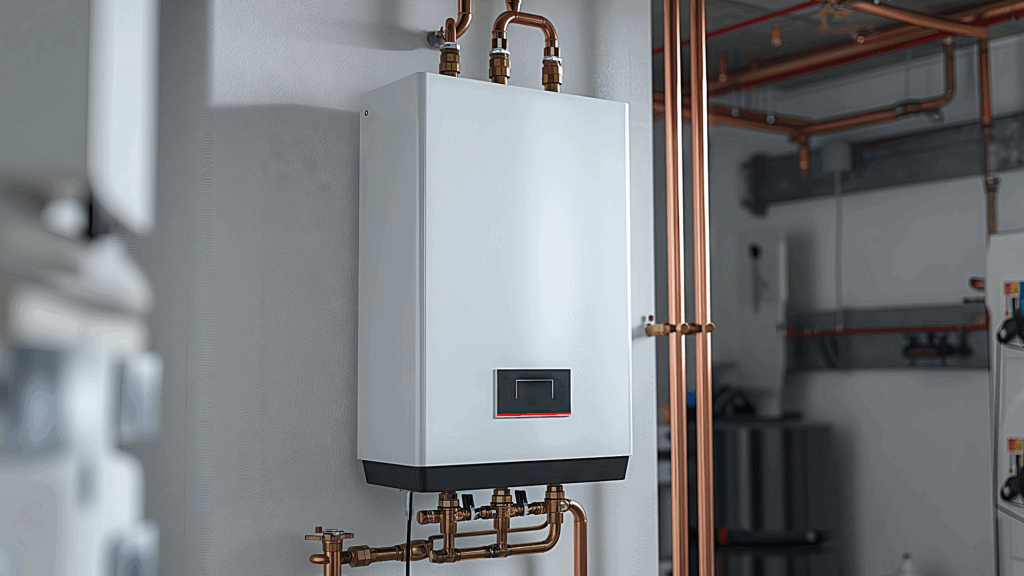Have you ever taken a steaming hot shower, only to run out of hot water before you’ve had a chance to rinse out the shampoo? When it comes to providing your Twin Cities home with hot water, you have essentially two main options: a traditional water heater or a modern tankless water heater. At Northern Benjamin Franklin Plumbing, we’re here to help you understand the differences so you can make an informed decision. Let’s dive into the pros and cons of each.
The Traditional Tank Water Heater: Tried and True
Most people grew up with a traditional tank water heater that stood in the basement or in a utility closet. Tank water heaters are constantly heating and storing hot water so it’s ready for immediate use. Cold water from the home’s main water line enters the water heater near the bottom, where a gas burner or electrical heating element turns up the temperature. As the water heats, it rises to the top of the insulated storage tank. When you turn on the tap for your hot shower, the hot water is drawn from a pipe located near the top of the storage tank and delivered to its preferred destination.
A tank water heater is kind of like a huge thermos, but even an insulated tank can’t keep the water hot forever. That’s why the unit is equipped with an adjustable thermostat that keeps an eye on the water and turns on the heating element to reheat the water as necessary. As you draw hot water from the top, the system continues to draw in new water and repeat the heating process as needed.
What’s good about tank water heaters? Tank water heaters and tried and true, and many of our customers like to stick with what they know. They tend to carry a lower upfront cost compared to the tankless models, and their installation is relatively straightforward. Tank water heaters are also built for high demand, depending on the size of the tank. If you have a lot of people who are trying to enjoy a hot shower in the morning, you may prefer the capacity of a tank water heater.
What are the drawbacks? But tank water heaters aren’t always the ideal hot water solution. Because the water is constantly heated and stored, the tank water heater can experience what’s known as “standby heat loss.” They consume energy even when no one is using the hot water. Tank heaters also have a limited capacity. Once the hot water supply is gone, you’ll have to wait for the tank heater to catch up. Finally, tank heaters take up space, whether they’re in the basement, utility closet or garage.
The Tankless Water Heater: On-Demand Efficiency
Tankless water heaters operate quite differently from their tank-based counterparts. Instead of storing and continuously heating a large volume of water, they only spring into action when there’s a demand for hot water. When you turn on the hot water tap, a flow sensor inside the tankless water heater tells the unit to get to work. Gas or electric water heaters rapidly heat the water and send it to the designated faucet or appliance. When you no longer need hot water, the flow sensor tells the heating elements to shut down. A storage tank isn’t necessary, because water is heated on demand with a tankless water heater.
Tankless water heater benefits: Perhaps one of the most popular benefits of the tankless models is the endless hot water. No more cold showers during our chilly Minnesota winters! Tankless units also use less electricity, because they’re only heating the water when you need it. This can lead to significant energy savings. These efficient models have a longer lifespan than the tank models, typically lasting 20 years or more. They’re also compact, mounting to a wall and freeing up floor space.
Tankless water heater drawbacks: Every benefit comes with a price, however, and tankless water heaters are no exception. Tankless water heaters cost more than a standard tank water heater, and installation can be tricky, which add to the bottom line. Tankless water heaters also have a limited flow rate. Yes, they’re able to provide endless hot water. But if hot water is being used in more than one location, users may notice a dip in water temperature or pressure. Tankless water heaters are well suited to warm or moderate climates, but with proper installation and insulation, Twin Cities’ homeowners can enjoy their benefits as well.
Which Water Heater Option is Best for You?
Are you still undecided? Ask yourself these questions to determine which water heater option is best for you:
What’s your budget? If the upfront cost is a concern, a traditional tank heater might be more appealing. On the other hand, a tankless water heater is more energy efficient, potentially cutting your electricity or gas bills.
How much hot water does your family use regularly? If you’re tired of running out of hot water, a tankless water heater may be the superior choice.
How much space do you have? Tank water heaters need their own dedicated space. Tankless models can be easily mounted on a wall. If you want to explore water heater options, reach out now to Northern Benjamin Franklin Plumbing at (320) 559-3407 to schedule an appointment. Northern Benjamin Franklin Plumbing is your hot water experts, offering complete plumbing services for Twin Cities homes and businesses.

